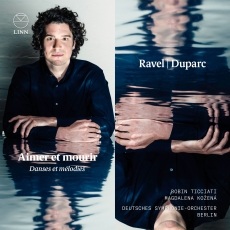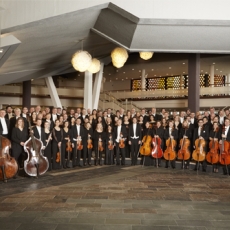Robin Ticciati & DSO - Ravel & Duparc: Aimer et mourir - Fanfare (PS)
In Fanfare 41:3 I reviewed a previous disc by these artists, containing music by Fauré and Debussy. I had some problems with it at the time, and finished my piece by suggesting it had to be played loud to make an effect. Well, I have been playing that disc loudly—and softly—for over a year now, and my niggling caveats have melted away. (Critics, like voters or Hollywood spouses, can change our minds over 12 months.)
If anything, this follow-up of more French fare is even better than the first, featuring music that plays well to the performers’ considerable strengths. Once again, the advantage of this program over a purely orchestral selection is the inclusion of songs; this time the “greatest hits” of Henri Duparc, who orchestrated them himself. Magdalena Kožena is an artist at the peak of her powers, and her performances marry beautiful tone, expressive shading, and the power to project at a concert level. I have not heard Kožena in concert, so I don’t know how much the recording engineer is responsible for this. Her voice is balanced fairly close, but it works: Listen, for example, to her expansive rendition of Duparc’s Phydilé, with its rich climax. Kožena and Ticciati, while taking a lusher, operatic approach, rival the great recording of three of these songs made in 1977 by Janet Baker with the London Symphony Orchestra under André Previn. That is high praise.
There is more competition in the Ravel orchestral works of course, but Ticciati and his Berlin forces make their point. Valses nobles et sentimentales has a Straussian kick to it at the opening and elsewhere (helped by the recording’s full bass frequencies), plus the requisite tenderness from the solo woodwinds for the sentimentale sections. The Second Suite from Daphnis et Chloé (minus chorus) is similarly anchored by a clean, present bass. Ticcicati’s climaxes are again expansive, yet the vibrant 5/8 rhythms of the concluding Danse générale have tremendous bite. A final surprise offering is Duparc’s rarely recorded Franckian tone-poem, Aux étoiles.
The partnership of DSO Berlin and its new principal conductor is achieving tangible results, and the Linn sound is spectacular. My reservation about opaque sound on the previous release is not repeated here, and further listening to that disc leads me to believe I exaggerated. In every way, this is a superb production—including, I might add, as a physical product. Thank heavens these well-designed CDs are still being made.



